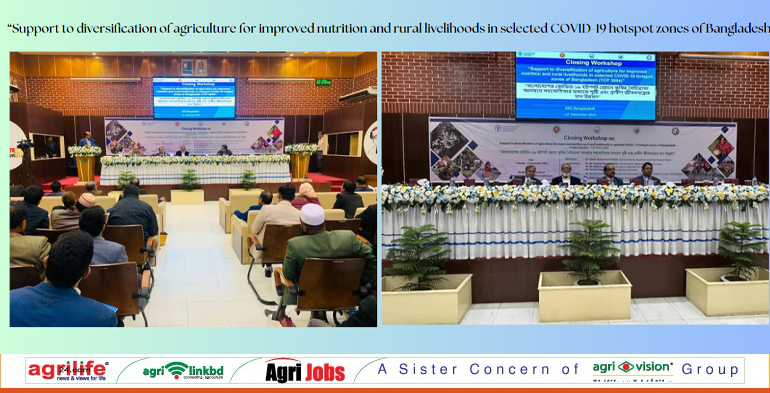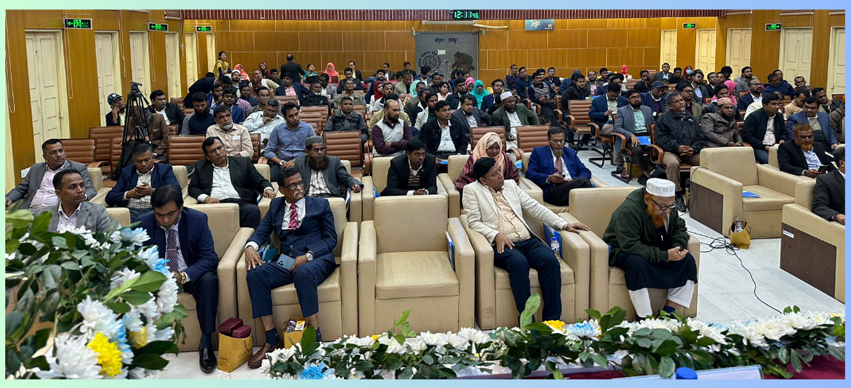
Agrilife24.om: The Food and Agriculture Organization of the United Nations (FAO) organized a closing workshop today for the project called Support to diversification of agriculture for improved nutrition and rural livelihoods in selected COVID-19 hotspot zones of Bangladesh.
The closing workshop was held Bangladesh Agricultural Research Council Auditorium with the participation of Dr. Mohit Kumar De, Director, Crops Wing, Department of Agricultural Extension as chair, Dr. Shaikh Mohammad Bokhtiar, Executive Chairman, Bangladesh Agricultural Research Council as Chief Guest, Mr Syed Md Alamgir, Principal Scientific Officer, Department of Fisheries and Paritosh Hajra, Joint Secretary, Ministry of Agriculture as Special Guests,
Nur Ahamed Khondaker, Assistant FAO Representative (Programme) and Officer-in-Charge, FAO Bangladesh as Guest of Honour.Two hundred (200) participants attended the workshop including officials of Ministry, DAE, DLS, DoF, academia, researchers and project beneficiaries from 44 Upazilas under 6 project districts.
During the workshop the speakers briefed the audience about the project activities done in relation to capacity enhancement of farmers, shared success stories and lessons learned from the implementation of the project and received the feedback from the stakeholders for improving the efficiency of project implementation in the future.
Mr Nur Ahamed Khondaker, Assistant FAO Representative (Programme) and Officer-in-Charge, FAO Bangladesh mentioned that under the present situation of climate change and transformation of agriculture FAO emphasised the introduction and enhancement of nutrition sensitive and climate resilient agricultural practices for the small and medium farm families of the country.
Mr Syed Md Alamgir, Principal Scientific Officer, Department of Fisheries said that he is very happy to see the integration of fisheries, livestock, and agriculture in this project intervention. Under this small TCP project the deliverables are impressive and scalable.
Mr Paritosh Hajra, Joint Secretary, Ministry of Agriculture mentioned that this project has been taken under the detrimental affect of COVID 19 pandemic to boost up the family nutrition of small and medium farm families of the project area. It is an integrated project with livestock fisheries and crop production considering the comprehensive nutritional aspects. So in future this concept could be scaled up in different projects and programme.

Dr. Shaikh Mohammad Bokhtiar, Executive Chairman of BARC highlighted the pilot interventions under the Technical Cooperation Programme (TCP) encourages farmers and agricultural practitioners for scaling up innovative and nutrition sensitive practices for the farmers.
The project worked with a total of 3560 farmers covering the areas of crops, livestock, backyard poultry and nutrition sensitive agriculture practices across all upazilas under the six districts, where nearly 30% beneficiaries are women. Major interventions done under the project include: two-week long Livestock Service Provider training of 60 farmers in Rural Development Academy (RDA), Bogura; Training of Trainers for district and Upazila level DAE and DoF Officials in the project working districts;, capacity building training of the farmers in crop agriculture, livestock and poultry farming and aquaculture; building awareness on community spread of COVID-19 and its adverse effects on nutrition and poverty; input supports for climate resilient crop, fish and poultry production including low lift pump, silo, spade, watering can for crop farmers, poultry feed and poultry for the livestock farmers and fish feed and fish fingerling for the fish farmers.
Background
FAO has been implementing a Technical Cooperation Programme (TCP) for the project titled “Support to diversification of agriculture for improved nutrition and rural livelihoods in selected COVID-19 hotspot zones of Bangladesh”. The project started in December 2020. During the outbreak of COVID-19 in late 2019 and early 2020 a new infectious disease has rapidly spread across the world including Bangladesh devastating lives and livelihoods. To address the issues of community spreads of COVID-19 on poverty and climate changes in the selected district of the Barind and Drought Prone Area (Dinajpur, Nilphamar and Lamonirhat) and the Coastal zone areas (Feni, Noakhali, Lakshmipur) the project has been put in force. It identified the existing production systems of crop, fisheries and livestock and their potentials and impediments; COVID-19 and climate resilient and nutrition sensitive crop production practices and interventions for diversification of agricultural produces and improved nutrition for the improvement of rural livelihoods.





















